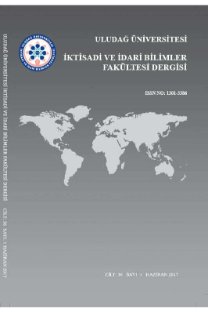Çevreyi korumanın makroekonomik değişkenler üzerindeki maliyetleri ve çevresel kalite-ekonomik güç ikilemi
Ekonomik olarak güçlü olmak her şeyden önce bağımsızlığın bir ön şartı olduğu gibi eğitim, sağlık, savunma, diplomasi gibi pek çok alanda avantaj sağlayan ve bu nedenle sahip olunması arzu edilen bir durumdur. Çünkü bu güç ile daha müreffeh bir toplum olunacağına inanılır. Dolayısıyla karar birimleri için ekonomik büyüme her zaman öncelikli hedef olmuştur. Ancak bunun getirdiği çeşitli sıkıntılar vardır. Daha çok üretme ve tüketme sayesinde gerçekleştirilebilecek ekonomik büyüme daha çok çevresel kaynağı kullanarak ve zararlı atıklar oluşturarak çevresel sorunları tetiklemektedir. Çevresel sorunlar dikkate alınmadığında ise küresel ısınma, iklim değişikliği ve ozon tabakasının delinmesi gibi ciddi problemler her geçen gün daha da ciddiyet kazanmaktadır. Bu sorunlar karşısında karar birimleri bir takım önlemleri devreye sokma zorunluluğu hissetmekte ancak bu önlemlerin getireceği maliyetlerin ekonomi üzerinde yol açacağı olumsuz etkilerden dolayı gerekli adımları atamamaktadırlar. Dolayısıyla çevreyi koruma ile ekonomik olarak güçlü olmak arasında bir ikilem ortaya çıkmaktadır.
Costs of protecting the environment on macroeconomic variables and the dilemma of environmental quality-economic power
Being economically powerful is a reality which brings many advantages. Forasmuch as, it’s desired fact, since being economically powerful is a prerequisite for independence as well as it ensures advantages in many areas such as education, health, defence, diplomacy. Because, it’s expected that this power creates more prosperous society. So, economic growth is a priority purpose for decision makers. But there are some problems caused by this expectation. Economic growth obtained by producing and consuming much more, causes environmental problems due to using more environmental values and producing hazardous waste. In case of not considering environmental values, serious problems like global warming, climate change and ozone depletion gradually accelerate. Decision makers think the necessity of taking some measures against these problems but they can’t make necessary policies owing to these policies’ undesired costs on economy. So a dilemma appears between protecting the environment and being economically powerful.
___
Aktan C. C. ve H. Şen (2002), “Ekonomik Kriz: Nedenler ve Çözüm Önerileri”, Yeni Türkiye Dergisi, 2.Barkley, P. W. and David W.S. (1972), Economic Growth and Environmental Decay: The Solution Becomes The Problem. Harcourt Brace Jovanovich.New York.
Başol K. ve M. F. Gökalp (xxxx), “Ekonomi İle Çevre Sorunları Arasındaki İlişkilere Bir Bakış-I”, Ekoloji Dergisi, http://www.ekolojidergisi.com.tr (21.02.2011).
Cao, Jing (2007), Essays on Environmental Tax Policy Analysis: Dynamic Computable General Equeilibrum Approaches Applied to China, Harward University, Unpublished Doctoral Thesis, Massachusetts.
Dağdemir, Özcan (2003), Çevre Sorunlarına Ekonomik Yaklaşımlar ve Optimal Politika Arayışları, Gazi Kitabevi, Ankara.
Ertürk, Hasan (1998), Çevre Bilimlerine Giriş (3. Baskı), Vipaş Yayınları, Bursa.
Gür, Nurullah (2008), The Effects Of Environmental Policies On Economic Developmen,. Marmara Üniversitesi Sosyal Bilimler Enstitüsü İktisat Ana Bilim Dalı. Yayımlanmamış Yüksek Lisans Tezi, İstanbul.
Hueting, Roefie (1991), “Correcting National Income For Environmental Losses: A Practical Solution For A Theoretical Dilemma”, In: Ecological Economics: The Science and Management of Sustainability (Ed: R. Costanza), Colombia University Press, New york.
Hur, Ga-hyeong (2000), “Double Dividend Hypothesis of Environmental Tax in Republic of Korea: For sustainable development”, 2nd International Critical Geography Conference Taegu University, Taegu, Korea.
Kriström, Bengt (2003), “Framework for Assessing the Distribution of Financial Effects of Environmental Policies”, OECD Environment Directorate, http://www-sekon.slu.se/~bkr/distribution.pdf (23.03.2011).
McKitrick, Ross (1997), “Double Dividend Environmental Taxation and Canadian Carbon Emissions Control”. Canadian Public Policy-Analyse de Politiques, 23 (4), 417–434.
Munasinghe, Mohan (2007), Making Development More Sustainable, http://www.eoearth.org/article/Sustainable_development_triangle. (08.02.2011).
Nordhaus, William (2007), The Challenge of Global Warming: Economic Models and Environmental Policy, Yale University, Yale.
Nowotny, Ewald (1980), “Inflation and Taxation: Reviewing The Macroeconomic Issues”, Journal of Economic Literature, 18 (3), 1025–1049.
OECD (2007), The Political Economy of Environmentally Related Taxes, Policy Brief.
Özdemir, Biltekin (2009), “Küresel Kirlenme Sürdürülebilir Ekonomik Büyüme ve Çevre Vergileri”, Maliye Dergisi, (156).
Panayotou, Theodore (2000), “Economic Growth and The Environment”, Harvard University -Center for International Devolopment, Working Paper, (56). http://www.hks.harvard.edu/var/ezp_site/storage/fckeditor/file/pdfs/centers- programs/centers/cid/publications/faculty/wp/056.pdf (20.01.2011).
Repetto, Robert (1995), Jobs, Competitiveness, and Environmental Regulation: What are The Real Issues?, World Resource Institute.
SQW (2006), Exploring The Relationship Between Environmental Regulation and Competitiveness – A Literature Review, http://www.sqw.co.uk/publications/archive (21.03.2011).
Stern, Nicholas (2007), The Economics of Climate Change, The Stern Revie, Cambridge University Pres, Cambridge.
Sturm D. and A. Ulph (2002), “Environment, Trade, Political Economy And Imperfect Information – A Survey”, Discussion Papers in Economics and Econometrics, http://www.soton.ac.uk/ (14.02.2010).
T.Ç.V. (1991), Ortak Geleceğimiz, Türkiye Çevre Sorunları Vakfı Yayını, Ankara.
Tuna, Muammer (2000), “Çevresel Sorunların Küreselleşmesi”. Muğla Üniversitesi SBE Dergisi, 1 (2).
Walker, G. and S. D. King. (2009), Dünyamız Isınıyor: Küresel Isınma ile Nasıl Başa Çıkabiliriz (Çev: Özkan Akpınar), Boğaziçi Üniversitesi Yayınevi, İstanbul.
- ISSN: 1301-3386
- Yayın Aralığı: Yılda 2 Sayı
- Başlangıç: 2018
Sayıdaki Diğer Makaleler
Mülteciler ve Ulusal/Uluslararası güvenlik
Türkiye, Çin ve Hindistan’ın sektörel rekabet gücü üzerine karşılaştırmalı bir inceleme
LEVENT KÖSEKAHYAOĞLU, Gökhan ÖZDAMAR
An approach to measuring brand loyalty in the Turkish automotive sector
Faaliyet tabanlı maliyetleme yönteminin inşaat taahhüt işletmelerinde uygulanması
Girişimci üniversite modeli ve Türkiye
Kobi’lerde süreç yönetimi uygulamalarının incelenmesi: Sakarya ili I.Organize Sanayi Bölgesi örneği
Aydın YILMAZER, HATİCE SARIALTIN
Gelir ve co2 emisyonu ilişkisi: Panel birim kök ve eşbütünleşme testi
Dolaysız yabancı sermaye yatırımları ve dış ticaret bilançosu: Türkiye üzerine bir uygulama
